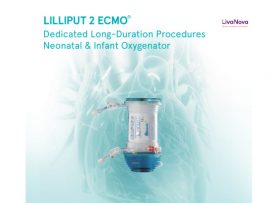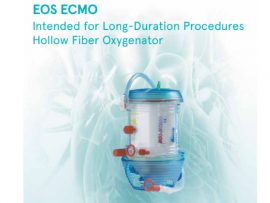Abstract Introduction Two techniques are commonly used for the femoral artery puncture closure during decannulation in venoarterial extracorporeal membrane oxygenation (V-A ECMO): the conventional post-closure technique and the small-sheath technique, also..
Read MoreAbstract Extracorporeal Membrane Oxygenation (ECMO) is a life-saving cardiopulmonary support for patients with acute heart failure. However, the process of weaning from veno-arterial (V-A) ECMO remains complex and risky. We..
Read MoreAbstract Extracorporeal membrane oxygenation (ECMO) supports patients with severe refractory cardiac or respiratory failure but managing residual circuit blood after weaning lacks consensus. After decannulation, the oxygenator and circuit retain..
Read MoreAbstract Weaning from veno-arterial extracorporeal membrane oxygenation (V-A ECMO) and determining the optimal timing for liberation from mechanical circulatory support (MCS) remain critical yet complex. Although multiple weaning protocols exist,..
Read MoreAbstract Extracorporeal membrane oxygenation (ECMO) is widely recognized as a life-saving measure. The use of veno-arterial extracorporeal membrane oxygenation (VA ECMO) is on the rise, serving as an effective mechanical..
Read MoreAbstract Objective To investigate the factors contributing to the "ECMO gap," the discrepancy between successful weaning from venoarterial extracorporeal membrane oxygenation (VA-ECMO) and survival to hospital discharge, using different definitions..
Read MoreAbstract Background Venoarterial extracorporeal membrane oxygenation (V-A ECMO) use to support patients in cardiac failure is increasing. Despite this increased use, predicting successful weaning from ECMO can be challenging, no..
Read MoreAbstract Background Clinical evidence regarding predictors of successful weaning from mechanical circulatory support (MCS) is lacking. This study aimed to create a simple risk score to predict successful weaning from..
Read MoreAbstract Fever following decannulation from extracorporeal membrane oxygenation (ECMO) poses diagnostic challenges. While infectious causes and thrombosis are typically considered, rare etiologies may be overlooked. We report the case of..
Read MoreAbstract Background Preliminary evidence from small, single-center studies suggests levosimendan may improve the likelihood of successful venoarterial extracorporeal membrane oxygenation (VA-ECMO) weaning in patients with cardiogenic shock. However, the literature..
Read MoreAbstract Background: We evaluated the impact of noninvasive respiratory support (NRS) and invasive mechanical ventilation duration before venovenous extracorporeal membrane oxygenation (VV-ECMO) on weaning from venovenous ECMO and survival. Methods: In..
Read MoreAbstract Aims Knowing the upper time limit for successful weaning from temporary mechanical circulatory support in cardiogenic shock will help with decision‐making regarding advanced heart failure (HF) therapy or considering..
Read MoreAbstract The use of veno-venous extracorporeal membrane oxygenation (VV-ECMO) has become increasingly prevalent, particularly in respiratory disease pandemics such as H1N1-influenza and SARS-CoV-2. This surge has emphasized the importance of..
Read MoreAbstract With advancements in (ECLS) technologies, venoarterial (VA-ECMO) has emerged as a crucial cardiopulmonary support mechanism. This review explores the significance of VA-ECMO system configuration, strategies, and timing of initiation. Through an analysis..
Read MoreAbstract Introduction Pump-controlled retrograde trial off (PCRTO) is described as an effective weaning strategy for veno-arterial extracorporeal membrane oxygenation (ECMO) in the guidelines. Contrastingly, there is no established weaning strategy..
Read MoreAbstract Venovenous extracorporeal membrane oxygenation (VV ECMO) facilitates the reduction of mechanical ventilation (MV) support in acute respiratory failure. Contrary to increasing evidence regarding its initiation, the optimal timing of..
Read MoreAbstract Venopulmonary (VP) extracorporeal membrane oxygenation (ECMO) is a mode capable of supporting both pulmonary and right ventricular (RV) functions. Weaning patients from VP ECMO requires careful assessment of both..
Read MoreAbstract Aims This study evaluated how well serial pulse pressure (PP) and PP adjusted by the vasoactive inotropic score (VIS) predicted venoarterial extracorporeal membrane oxygenation (VA-ECMO) weaning success and clinical..
Read MoreAbstract Weaning and liberation from VA ECMO in cardiogenic shock patients comprises a complex process requiring a continuous trade off between multiple clinical parameters. In the absence of dedicated international..
Read MoreAbstract Objective: Analysis of the prevalence and risk factors for weaning failure from venovenous extracorporeal membrane oxygenation (VV-ECMO) in patients with severe acute respiratory insufficiency. Design: Single-center retrospective observational study. Setting: Sixteen beds medical ICU at the University..
Read MoreAbstract BACKGROUND Post-cardiotomy veno-arterial extracorporeal membrane oxygenation (V-A ECMO) is characterized by discrepancies between weaning and survival-to-discharge rates. This study analyzes the differences between post-cardiotomy V-A ECMO patients who survived,..
Read MoreAbstract Background Safe and timely liberation from veno-venous extracorporeal membrane oxygenation (V-V ECMO) would be expected to reduce the duration of ECMO, the risk of complications, and costs. However, how..
Read MoreAbstract Objectives Extracorporeal cardiopulmonary resuscitation (eCPR) is increasingly used due to its beneficial outcomes and results compared to conventional CPR. After cardiac arrest, the overall ejection fraction is severely impaired;..
Read MoreAbstract Extracorporeal membrane oxygenation (ECMO) has strikingly progressed over the last 20 years in the management of adult and pediatric severe respiratory and cardiac dysfunctions refractory to conventional management. In this..
Read MoreAbstract Veno-venous extracorporeal membrane oxygenation (V–V ECMO) has an established evidence base in acute respiratory distress syndrome (ARDS) and has seen exponential growth in its use over the past decades...
Read MoreAbstract Venoarterial extracorporeal membrane oxygenation (VA ECMO) is a form of temporary mechanical circulatory support and simultaneous extracorporeal gas exchange for acute cardiorespiratory failure, including refractory cardiogenic shock (CS) and..
Read MoreAbstract The use of veno-arterial extracorporeal membrane oxygenation (VA ECMO) for the treatment of refractory cardiogenic shock has increased signifcantly. Nevertheless, early weaning may be advisable to reduce the potential..
Read MoreAbstract Venoarterial extracorporeal membrane oxygenation (V-A ECMO) is increasingly used in cardiogenic shock for rapid stabilization and bridging towards recovery, long-term mechanical circulatory support or transplant. Although technological advances have..
Read MoreAbstract Venoarterial extracorporeal membrane oxygenation (VA ECMO) has been increasingly applied in patients with cardiogenic shock in recent years. Nevertheless, many patients cannot be successfully weaned from VA ECMO support..
Read MoreAbstract Background The optimal strategy of weaning veno-arterial (V-A) extracorporeal membrane oxygenation (ECMO) remains poorly described. Pump-controlled retrograde trial off (PCRTO) involves serial decremental pump revolutions until a retrograde flow..
Read More



















